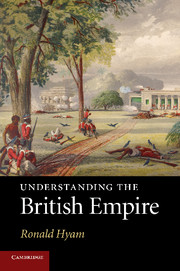Book contents
- Frontmatter
- Contents
- List of plates
- List of figures
- List of maps
- List of tables
- Preface
- Acknowledgements
- List of abbreviations
- Introduction: perspectives, policies, and people
- I Dynamics: geopolitics and economics
- 1 The primacy of geopolitics: the dynamics of British imperial policy, 1763–1963
- 2 The partition of Africa: geopolitical and internal perspectives
- 3 The empire in a comparative global context, 1815–1914
- 4 The myth of ‘gentlemanly capitalism’
- II Ethics and religion
- III Bureaucracy and policy-making
- IV Great men
- V Sexuality
- VI Imperial historians
- Published writings of RH on imperial history
- Index
2 - The partition of Africa: geopolitical and internal perspectives
Published online by Cambridge University Press: 05 August 2012
- Frontmatter
- Contents
- List of plates
- List of figures
- List of maps
- List of tables
- Preface
- Acknowledgements
- List of abbreviations
- Introduction: perspectives, policies, and people
- I Dynamics: geopolitics and economics
- 1 The primacy of geopolitics: the dynamics of British imperial policy, 1763–1963
- 2 The partition of Africa: geopolitical and internal perspectives
- 3 The empire in a comparative global context, 1815–1914
- 4 The myth of ‘gentlemanly capitalism’
- II Ethics and religion
- III Bureaucracy and policy-making
- IV Great men
- V Sexuality
- VI Imperial historians
- Published writings of RH on imperial history
- Index
Summary
[Most historians have a fondness for their first published work, though few would be able to eclipse Sir Geoffrey Elton, who astonished readers of his collected essays (1974) on Tudor political history by kicking off with a paper on ‘The terminal date of Caesar's Gallic proconsulate’ (reprinted from Journal of Roman Studies, vol. 36, 1946).
My first publication was a review article entitled ‘The partition of Africa’ (Historical Journal, vol. 7, 1964), a subject which I have revisited more than once. Instead of reprinting this, what follows is a chapter from Britain's imperial century (2nd edn 1991, 3rd edn 2001), which develops more fully some of the major themes tentatively put forward in the original essay. It has been lightly revised.]
You may roughly divide the nations of the world as the living and the dying … In these [dying] states, disorganisation and decay are advancing almost as fast as concentration and increasing power are advancing in the living nations that stand beside them … the weak states are becoming weaker and the strong states are becoming stronger … For one reason or another – from the necessities of politics or under the pretence of philanthropy, the living nations will gradually encroach on the territory of the dying, and the seeds and causes of conflict among civilised nations will speedily appear … […]
- Type
- Chapter
- Information
- Understanding the British Empire , pp. 98 - 116Publisher: Cambridge University PressPrint publication year: 2010



